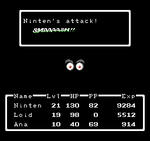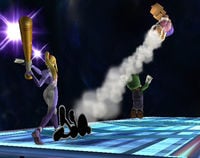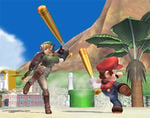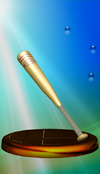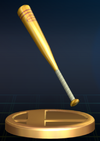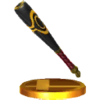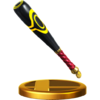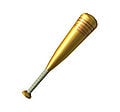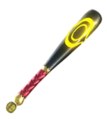Home-Run Bat: Difference between revisions
| Line 45: | Line 45: | ||
===In Home-Run Contest=== | ===In Home-Run Contest=== | ||
In the [[Home-Run Contest]], the player is given a Home-Run Bat to assist in sending the [[Sandbag]] as far away from the starting platform as possible within | In the [[Home-Run Contest]], the player is given a Home-Run Bat to assist in sending the [[Sandbag]] as far away from the starting platform as possible within ten seconds. While acting as the primary way to hit the Sandbag for the large majority of characters, some attacks can potentially send it farther than the actual weapon at certain high enough damages, including throwing the Home-Run Bat itself. | ||
===Damage=== | ===Damage=== | ||
Revision as of 13:17, January 7, 2021
| Home-Run Bat | |
|---|---|
{{{content1}}}
{{{content2}}}
{{{content3}}}
{{{content4}}}
{{{content5}}}  The Home-Run Bat. | |
| Universe | Super Smash Bros. |
| Appears in | SSB Melee Brawl SSB4 Ultimate |
| Item class | Battering |
The Home-Run Bat (ホームランバット, Home Run Bat) is a battering item in all Super Smash Bros. games. It is best-known for its one-hit KO potential.
Origin
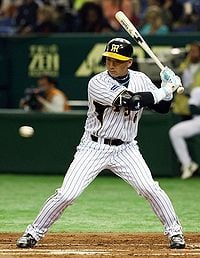
The Home-Run Bat originates from the bat-and-ball sport baseball, which has a particularly strong following in Japan and is known as a national pastime of the United States. In the sport, the bat acts as the way that the player hits the baseball being tossed at them; the best batters are not only able to hit the ball, but also with sufficient power to send it to the fringes of the playing area, away from players of the other team. Should the batter hit with the correct timing and angling, the ball can be sent out of the playing area or even out of the park; these instances are referred to as home runs, as all players on the batter's team can finish a run in the playing area. Most home runs, however, also require almost perfect placement of the ball against the bat; in this case, a hit closer to the tip of the bat provides more power behind a swing, whereas one closer to the handle leads to a weaker hit. In Super Smash Bros., this is mirrored by how the bat is more powerful when hitting with the tip, and how it sends opponents away at extreme velocities and trajectories; mirroring how home runs are sent over the walls of the playing field, the resulting angle of the opponents hit with the bat are also sent upward instead of a semi-spike trajectory. Adding to these references, players also tend to bring the bat slightly farther behind them just before hitting, as to put more power behind the swing; this is emulated in Brawl, where players wind-up for a time as though to get more power behind their swings.
In addition to the real-life counterpart, another possible inspiration for the item is speculated to come from the EarthBound series. Ninten and Ness, the main protagonists in EarthBound Beginnings and EarthBound, respectively, use bats as their main weapon throughout the game. As the game progresses, the player will find increasingly powerful bats. In a battle, there's a random chance (decided by the Guts stat in EarthBound) that the attack will be a critical hit (or "SMAAAASH!!" attack), which deals more damage than an ordinary attack. If these games influenced the Home-Run Bat's behavior, then it can be said that the one-hit KO smash attack comes from the critical hits. This theory is further backed up by the fact that Ness' forward smash in Super Smash Bros. and Melee makes a ping sound like the Home-Run Bat's. Additionally, the Casey Bat in EarthBound has similarities to the Home-Run Bat's mechanics: the Casey Bat has very low accuracy (causing the player to miss a lot when equipped), however, it is the highest offense-raising equipment for Ness in the game. If an attack connects it can deal a lot of damage and possible one-hit KOs. This is comparable to how the Home-Run Bat's windup makes it difficult to hit an opponent, but when it does it results in a one-hit KO.
Operation
In battles
While the Home-Run Bat functions like regular battering items, it has the unusual property of completely altering the character's forward smash. Upon performing a forward smash, the character winds up and performs a single, delayed swing that can potentially KO opponents in a single hit. The attack always takes a set amount of time and cannot be charged, making it the only such item to alter this mechanic in players. Super Smash Bros. 64 has the fastest wind-up time in a vacuum.
Along with its signature forward smash, the Home-Run Bat is also powerful when swung or thrown normally, being capable of KOing relatively early, especially in regards to its dash attack and smash throws.
In Smash 64 and Melee, characters use their standard item swinging animation; however, from Brawl onward the animation was changed so that all characters wind up like actual baseball players when performing the forward smash. This altered wind-up causes the attack to be considerably slower than in previous games.
In SSB4, the smash attack swing is comparably faster than in Brawl. In addition, a smash attack swing gives the user super armor at the very moment he or she swings the bat and is capable of instantly breaking shields. These factors make it more dangerous to interrupt head-on when compared to previous games. Starting in SSB4, the bat swing can also reflect projectiles. In Ultimate, the Home-Run Bat will interrupt its forward smash swing when charging to reflect a projectile; reflecting swings have the same power as a standard forward smash, effectively giving them a nearly instant charge time if it happens to reflect a projectile.
The Home-Run Bat deals most of its damage at the tip of the bat instead of the center; the extreme knockback in both of these hitboxes, however, makes this point relatively moot against other players (though very important in the Home-Run Contest, where the former is commonly known as a "tipper"). The Bat is also powerful when thrown, dealing around 20% damage and high knockback.
The bat is also an item in Smash Tour: when its trophy is selected, the user starts the battle wielding a Home-Run Bat.
In Home-Run Contest
In the Home-Run Contest, the player is given a Home-Run Bat to assist in sending the Sandbag as far away from the starting platform as possible within ten seconds. While acting as the primary way to hit the Sandbag for the large majority of characters, some attacks can potentially send it farther than the actual weapon at certain high enough damages, including throwing the Home-Run Bat itself.
Damage
| Action | SSB | Melee | Brawl | SSB4 | Super Smash Bros. Ultimate (no 1.2x multiplier) |
|---|---|---|---|---|---|
| Jab | 7% | 7% | 7% | 7% | 7% |
| Forward tilt | 12% | 12% | 12% | 13% | 13% |
| Dash attack | 16% | 16% | 15% | 16% | 16% |
| Dash attack (Mewtwo) | N/A | 14% | N/A | 16% | 16% |
| Dash attack (Zelda) | N/A | 23%(16%+7%) | 14% | 16% | 16% |
| Dash attack (Peach) | N/A | 30%(16%+14%) | 16% | 16% | 16% |
| Forward smash | 10% | 20% | 30% | 30% | 30% |
| Forward smash (Captain Falcon) | 10% | 30% (8%+22%) | 30% | 30% | 30% |
| Forward smash (Ganondorf) | N/A | 20% | 30% | 30% | 30% |
| Forward smash (Sheik) | N/A | 23%(8%+15%) | 30% | 30% | 30% |
| Forward smash (Sourspot) | N/A | 8% | 15% | N/A | N/A |
| Drop | 6% | 10% | 17% | 11% | 11.9% max depending on distance |
| Forward tilt throw | 18% | 19% | 18% | 16% | 19.3% max depending on distance |
| Up tilt throw | 17% | 20% | 20% | 23% | 20.8% max head, 18.8% max anywhere else |
| Down tilt throw | 15% | 17% | 17% | 17% | 15.2% |
| Dash attack throw | 23% | 21% | 21% | 21% | 21.8% max depending on distance |
| Forward smash throw | 23% | 22% | 22% | 21% | 22.5% max depending on distance |
| Up smash throw | 23% | 23% | 20% | 22% | 23.8% max head, 21.8% max anywhere else |
| Down smash throw | 23% | 25% | 21% | 20% | 15.2% |
| Aerial drop | 19% | 14% | 18% | 18% | 11.6%-18.6% depending on distance |
| Aerial forward tilt throw | 20% | 19% | 19% | 19% | 19.3% max depending on distance |
| Aerial up tilt throw | 21% | 20% | 20% | 20% | 23.8% max |
| Aerial down tilt throw | 22% | 21% | 20% | 20% | 15.2%-20.6% depending on distance |
| Aerial forward smash throw | 23% | 19% | 19% | 18% | 22.5% max depending on distance |
| Aerial up smash throw | 24% | 20% | 20% | 20% | 23.8% max head, 21.8% max anywhere else |
| Aerial down smash throw | 24% | 21% | 20% | 20% | 15.2-20.6% depending on distance |
Trophies
Melee trophy description
Smash an enemy with this slugger, and you'll send them flying out of sight; hence the name Home-Run Bat. The sound of the bat being swung immediately strikes fear into the hearts of opponents and can turn the tide of a battle. It's slightly risky to use, though; it has a very limited range, and it takes a little time to wind up for your swing.
- 04/99
Brawl trophy description
A battering item. Smash a foe with this and be rewarded with the distinctive "KREEEEENG!" sound of a home run as your foe goes flying. The sound echoes with what's surely the timbre of supreme bliss. For the character being hit, though, it must be one of the scariest sounds ever. But it's not easy to use-- it swings slowly and has a limited range. High risk, high reward.
SSB4 trophy description
Combine this black bat with a forward smash to try for a home run, using an opponent as the ball! Unfortunately, the reach on the bat is not all that impressive, so it takes some real skill to line up a hit. Keep your chin up, though-the loud "KREEENG" of a hit makes it all worthwhile.
Batter up! (That's what they say right?) Get a home run by side-smashing an enemy right off the stage! Enemies are more difficult to send flying than baseballs, though - or so we're told - and this bat doesn't exactly have a long reach, so if you want to hear the satisfying sound of your foe flying off-screen, you'll have to work for it!
Gallery
Super Smash Bros.
Super Smash Bros. Melee
Mewtwo using the Home-Run bat.
- MarioHomeRunContestMeleeLastSecond.jpg
Mario using the bat in the Home-Run Contest.
Super Smash Bros. Brawl
Super Smash Bros. for Nintendo 3DS
Mii Brawler holding the bat in the Home-Run Contest.
Super Smash Bros. for Wii U
Zero Suit Samus is about to send Sandbag flying with the Home-Run Bat.
Super Smash Bros. Ultimate
Banjo & Kazooie holding the bat in the Home-Run Contest.
Names in other languages
Trivia
- Fittingly, the ornate redesign of the Home-Run Bat in Smash 4 and Ultimate matches the colors of the "Deadly Blow" effect that appears when a character is hit by an attack strong enough to immediately KO.
- Bayonetta, Joker, and Byleth are the only characters who speak when using a smash attack with the Home-Run Bat. Both Joker and Byleth say "You're mine!" and "Take this!" respectively, while Bayonetta has five different lines, which are "Fire!", "Bingo!", "Goodbye!", "See you!", and "Boom!".
- The Home-Run Bat's forward smash in Melee is the attack that deals the most extra shield damage in the entire series, dealing 119%.
- In Brawl, Wolf is the only character who vocalizes when swinging the bat rather than during the windup. This was eventually carried over to nearly every character in Ultimate except for both Falco and Nana.
External links
| Items in Super Smash Bros. (64) | |
|---|---|
| Normal | Beam Sword · Bob-omb · Bumper · Fan · Fire Flower · Green Shell · Hammer · Heart Container · Home-Run Bat · Maxim Tomato · Motion-Sensor Bomb · Poké Ball · Ray Gun · Red Shell · Star Rod · Starman |
| Containers | Barrel · Capsule · Crate · Egg |
| Items in Super Smash Bros. Melee | |
|---|---|
| Normal | Barrel Cannon · Beam Sword · Bob-omb · Bunny Hood · Cloaking Device · Fan · Fire Flower · Flipper · Food · Freezie · Green Shell · Hammer · Heart Container · Home-Run Bat · Lip's Stick · Maxim Tomato · Metal Box · Motion-Sensor Bomb · Mr. Saturn · Parasol · Poison Mushroom · Poké Ball · Ray Gun · Red Shell · Screw Attack · Star Rod · Starman · Super Mushroom · Super Scope · Warp Star |
| Containers | Barrel · Capsule · Crate · Egg · Party Ball |
| Other | Smash Coins |
| Items in Super Smash Bros. Brawl | |
|---|---|
| Normal | Assist Trophy · Banana Peel · Beam Sword · Blast Box · Bob-omb · Bumper · Bunny Hood · Cracker Launcher · Deku Nut · Dragoon · Fan · Fire Flower · Food · Franklin Badge · Freezie · Golden Hammer · Gooey Bomb · Green Shell · Hammer · Heart Container · Home-Run Bat · Hothead · Lightning Bolt · Lip's Stick · Maxim Tomato · Metal Box · Motion-Sensor Bomb · Mr. Saturn · Pitfall · Poison Mushroom · Poké Ball · Ray Gun · Screw Attack · Smart Bomb · Smash Ball · Smoke Ball · Soccer Ball · Spring · Star Rod · Starman · Super Mushroom · Super Scope · Superspicy Curry · Team Healer · Timer · Unira · Warp Star |
| Containers | Barrel · Capsule · Crate · Party Ball · Sandbag · Rolling Crates |
| The Subspace Emissary |
Key · Stock Ball · Trophy Stand |
| Collectibles | CD · Coins · Sticker · Trophy |
| Other | Smash Coins and Bills |
| Smash Tour | |
|---|---|
| Red items | Back Shield · Black Knight · Bob-omb · Boo · Bunny Hood · Daisy (Baseball) · Darkrai · Dixie Kong · DK Barrel · Energy Tank · Franklin Badge · Hammer · Home-Run Bat · Kat & Ana · Latias & Latios · Magnus · Majora's Mask · Mecha-Fiora · Metal Box · Mr. Resetti · Mr. Saturn · Ore Club · Phosphora · Plasm Wraith · Poison Mushroom · Rocket Belt · Sidestepper · Steel Diver · Super Mushroom · Super Scope · Ultimate Chimera · Wolfen · X Bomb |
| Blue items | Ashley · Boss Galaga · Bus to the City · Chain Chomp · Dillon · Doc Louis · Excitebike · Ghosts (Luigi's Mansion) · Great Fox · Isabelle · POW Block · Riki · Snorlax · Super Star · Tetra · Timmy & Tommy · Tingle · Yellow Wollywog · Zinger |
| Green items | Porky Minch · Proto Man · Substitute Doll |
| Random events | Banzai Bill · Flying Man · Iridescent Glint Beetle · Kamek · Koffing · Metal Face · Metroid · Nabbit · Reaper · Ridley · Souflee · Tac · Yellow Devil |

